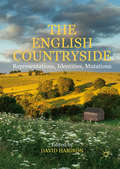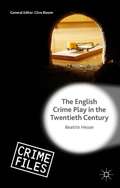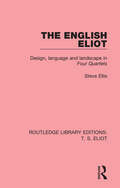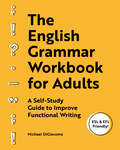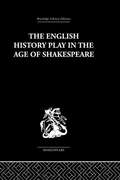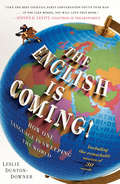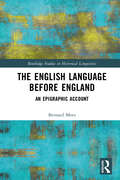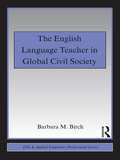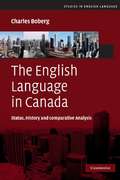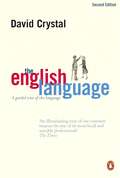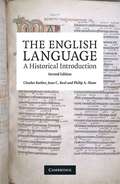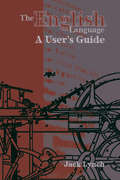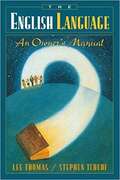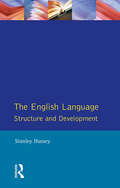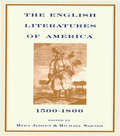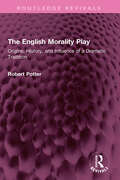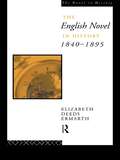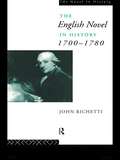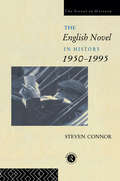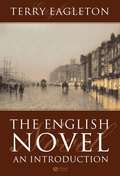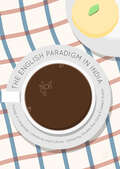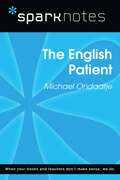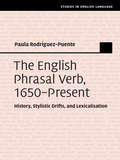- Table View
- List View
The English Countryside
by David HaigronThis collection of essays examines representations of the English countryside and its mutations, and what they reveal about a nation's, communities' or individuals' search for identity - and fear of losing it. Based on a pluridisciplinary approach and a variety of media, this book challenges the view that the English countryside is an apolitical space characterised by permanence and lack of conflict. It analyses how the pastoral motif is actually subverted to explore liminal spaces and temporalities. The authors deconstruct the "rural idyll" myth to show how it plays a distinctive and yet ambiguous part in defining Englishness/Britishness. A must read for both scholars and students interested in British rural and cultural history, media and literature.
The English Crime Play in the Twentieth Century (Crime Files)
by Beatrix HesseThis is the first comprehensive study of the English crime play, presenting a survey of 250 plays performed in the London West End between 1900 and 2000. The first part is historically orientated while the second one establishes a tentative poetics of the genre. The third part presents an analysis of some 20 plays adapted from detective fiction.
The English Eliot: Design, Language and Landscape in Four Quartets (Routledge Library Editions: T. S. Eliot #Vol. 3)
by Steve EllisThis book, first published in 1991, supplies a neglected cultural context for T. S. Eliot’s writings of the 1930s and 1940s, particularly Four Quartets, and attempts to disprove the widespread belief in Eliot’s unproblematic commitment to England, and the ‘Englishness’. The book traces Eliot’s classicism not only in linguistic and formalist terms but also in his construction of England in the Quartets and Quartets-related essays. His practice is related to the vigorous polemic concerning the definition of England found in the 1930s and 1940s, in material as diverse as landscape painting, advertising, travel literature and the detective novel. This original and provocative text will not only be of interest to students and teachers of Eliot, but to those interested in representations of nationality.
The English Grammar Workbook for Adults: A Self-Study Guide to Improve Functional Writing
by Michael DiGiacomoThe engaging, self-guided way to sharpen your grammar and write better!Mastering English grammar can be a real challenge. But never fear! The English Grammar Workbook for Adults is here to help improve your writing fluency so you can feel confident while crafting emails, cover letters, birthday cards and more.No matter your current skill level, this English grammar workbook has everything you need to learn essential elements, including nouns, verbs, adjectives, adverbs, tenses, and beyond. Then, you'll apply what you've learned to everyday situations you could encounter at school, at work, social situations, creative writing, online, and more.Fun & functional—This clear, concise book is essential for ESL/EFL and other grammar students who want to work on writing English.Situational success—Get expert tips on how grammar applies to real-world scenarios.Easy to use—Find quick answers to your English grammar questions using text boxes and the expanded index in the back of the book.Learning how to communicate more clearly is a snap with The English Grammar Workbook for Adults.
The English History Play in the age of Shakespeare
by Irving Ribner.First published in 1957. This edition re-issues the second edition of 1965. Recognized as one of the leading books in its field, The English History Play in the Age of Shakespeare presents the most comprehensive account available of the English historical drama from its beginning to the closing of the theatres in 1642 and relates this development to Renaissance historiography and Elizabethan political theory.
The English Is Coming!
by Leslie Dunton-DownerEnglish has fast become the number one language for everything from business and science, diplomacy and education, entertainment and environmentalism to socializing and beyond--virtually any human activity unfolding on a global scale. Worldwide, nonnative speakers of English now outnumber natives three to one; and in China alone, more people use English than in the United States--a remarkable feat for a language that got its start as a mongrel tongue on an island fifteen hundred years ago.Through the fascinating stories of thirty English words used and understood in nearly all corners of the globe, The English Is Coming! takes readers on an eye-opening journey across culture and commerce, war and peace, and time and space. These mini-histories shed new light on everyday words: the strange turns of fate by which their meanings evolved and their new roles as the building blocks of the first language ever to forge a global community. Exploring such familiar terms as shampoo (from a Hindi word for scalp and body hygiene long practiced in India); robot (coined by Czech painter Josef Capek for his brother Karel's 1921 play about man-made creatures); credit (rooted in a prehistoric phrase of sacred significance: "to put heart into"); and dozens of others, Dunton-Downer reveals with clarity and humor how these linguistic artifacts embody the resilience, appeal, adoptability, and wild inclusiveness that English, through a series of historical accidents, gained on its road to worldwide reach. These words explain not only how English has managed to link our distant and often disparate pasts but also how it is propelling humankind to a future that we can, for the first time, talk about and shape in a language that now belongs to all of us: Global English. Perfect for culture buffs, armchair travelers, and language lovers alike, The English Is Coming! is sure to inspire truly global conversations for decades to come.
The English Language
by Charles Barber Joan C. Beal Philip A. ShawThis bestselling text by Charles Barber, with updating contributions from Joan C. Beal and Philip A. Shaw, recounts the history of the English language from its remote ancestry to the present day. Using dozens of familiar texts, including the English of King Alfred, Shakespeare and Chaucer, the English language is explored in terms of where it came from, where it is going and the global impact it has had, taking into account the many varieties of English that now exist. Stimulating and interesting, it is not only written for specialists on language and linguistics, but also for general readers who take an interest in the subject.
The English Language Before England: An Epigraphic Account (Routledge Studies in Historical Linguistics)
by Bernard MeesThis pioneering work explores epigraphic evidence for the development of English before the Anglo-Saxon period, bringing together linguistic, historical and archaeological perspectives on early inscriptions, making them more accessible to a wider audience. The volume offers a new account of the Germanic development of Anglo-Saxon England, beginning with an examination of the earliest inscriptions from northern Europe and the oldest inscriptions preserving Germanic names, many of which have only been discovered since the 1980s. The book charts the origins of key terms such as Angle, Saxon and Jute and early writing systems used by Germanic peoples. Drawing on epigraphic evidence from northwestern Germany through to southwestern Denmark and sub-Roman Britain, Mees situates the analysis within historical and linguistic frameworks but also provides archaeological contextualisations, assessed chronologically, for the inscriptions. Taken together, the work re-examines existing models of the early development of English through the lens of contemporary approaches, opening paths for new directions in research on historical dialectology. This book is key reading for students and scholars interested in the history of English and historical linguistics.
The English Language Teacher in Global Civil Society (ESL & Applied Linguistics Professional Series)
by Barbara M. BirchHow can English language teachers contribute to peace locally and globally? English language teachers and learners are located in the global civil society – an international network of civil organizations and NGOs related to human rights, the environment, and sustainable peace. English, with its special role as an international language, is a major tool for communication within this network. On the local level, many teachers are interested in promoting reconciliation and sustainable peace, but often do not know how to do so. This book provides information, analysis, and techniques to help teachers around the world take action toward this goal. Balancing, in a readable and accessible way, the global and the local, core and periphery, cultural diffusion and resistance, theory and practice, pessimism and optimism, outsider and insider perspectives, the expert role and the apprentice role, and prescriptive and elicitive methods, it offers an alternative to literature about critical applied linguistics, globalization, and peace education that is simply too complex and wordy to spread easily from theoretician to the classroom teacher. The English Teacher in Global Civil Society: synthesizes threads from many fields and topics into a coherent and empowering argument for the activist role English language teachers can take to promote social change draws on humanistic education, peace education, cross-cultural understanding, problem-posing, cooperative learning, and critical thinking methodologies to help English language teachers learn how to teach conflict resolution skills in their classrooms covers issues in critical applied linguistics, approaches and methodologies in ESL/EFL, global and local curricular issues, and specific skill areas such reading, writing, and speaking suggests a new goal for English language teachers: global citizenship. This engaging, informative, provocative, and highly readable book is a welcome resource for English language teacher trainers, pre-service teachers, practicing classroom teachers, and Peace Corps workers around the world.
The English Language in Canada
by Charles BobergThe English Language in Canada examines the current status, history and principal features of Canadian English, focusing on the 'standard' variety heard across the country today. The discussion of the status of Canadian English considers the number and distribution of its speakers, its relation to French and other Canadian languages and to American English, its status as the expressive medium of English Canadian culture and its treatment in previous research. The review of its history concentrates on the historical roots and patterns of English-speaking settlement that established Canadian English and influenced its character in each region of Canada. The analysis of its principal features compares the vocabulary, pronunciation and grammar of Canadian English to standard British and American English. Subsequent chapters examine variation and change in the vocabulary and pronunciation of Canadian English, while a final chapter briefly considers the future of Canadian English.
The English Language: A Guided Tour of the Language
by David CrystalThis is the definitive survey of the English language - in all its forms. Crystal writes accessibly about the structure of the language, the uses of English throughout the world and finally he gives a brief history of English. The book has been fully revised and there is a fascinating new chapter on 'The effect of technology' on the English language. 'Illuminating guided tour of our common treasure by one of its most lucid and sensible professionals' The Times 'A splendid blend of erudition and entertainment' THES
The English Language: A Historical Introduction
by Charles Barber Joan C. Beal Philip A. ShawWhere does today's English come from? This new edition of the bestseller by Charles Barber tells the story of the language from its remote ancestry to the present day. In response to demand from readers, a brand new chapter on late modern English has been added for this edition. Using dozens of familiar texts, including the English of King Alfred, Chaucer, Shakespeare, and Addison, the book tells you everything you need to know about the English language, where it came from and where it's going to. This edition adds new material on English as a global language and explains the differences between the main varieties of English around the world. Clear explanations of linguistic ideas and terms make it the ideal introduction for students on courses in English language and linguistics, and for all readers fascinated by language.
The English Language: A User's Guide
by Jack LynchUpdated and expanded from one of the most popular grammar sites on the web, this book provides a modern guide to English usage for the 21st century. With topics arranged alphabetically and written in an enjoyable and readable tone, The English Language: A User's Guide will help students and writers understand the nature of the language, explaining the 'why' of the rules as well as what constitutes good grammar and style. Going beyond the prescriptive wrong /right examples, Jack Lynch includes examples of weak/strong, good/better, disputed/preferred, and informal/formal usage.
The English Language: An Owner's Manual
by Lee Thomas Stephen TchudiThe English Language: An Owner's Manual is the first text designed to be used in general introductory courses in the English language that is reader friendly, accessible, and fun. Rather than focus on technical linguistics, the book offers a more eclectic set of topics to introduce students to various aspects of language. Its goals are to draw on the daily use of language, especially students' own language; explore the cultural significance of so called “traditional” grammar as a set of tools and terms; and give students a basic understanding of the modern linguistic view of language as a rule governed system. The focus throughout is on language analysis that students should find more relevant: that language is a system of universal qualities, that it is dynamic and always changing, and that studying it pushes us to rethink the assumptions we have about language.
The English Language: Structure and Development
by Stanley HusseyThe 'correct' use of English has been the subject of vigorous debate in recent years. But what defines 'correctness' in our use of language? And how has this altered over time? In this authoritative survey of the history of the English language, the author examines how linguistic traditions have changed and developed over the centuries to produce the language that we are familiar with today.Taking present-day usage as its starting point, the book uses a topic-based approach to explore the historical development of vocabulary, grammar, syntax, sounds and spellings, thus providing both a firm sense of the structure of the language and an outline of its history.
The English Literatures of America: 1500-1800
by Michael Warner Myra JehlenThe English Literatures of America redefines colonial American literatures, sweeping from Newfoundland and Nova Scotia to the West Indies and Guiana. The book begins with the first colonization of the Americas and stretches beyond the Revolution to the early national period. Many texts are collected here for the first time; others are recognized masterpieces of the canon--both British and American--that can now be read in their Atlantic context. By emphasizing the culture of empire and by representing a transatlantic dialogue, The English Literatures of America allows a new way to understand colonial literature both in the United States and abroad.
The English Morality Play: Origins, HIstory, and Influence of a Dramatic Tradition (Routledge Revivals)
by Robert A PotterFirst published in 1975, The English Morality Play is the extended history of the English morality play, its persistence and flourishing as a dramatic tradition. The book sheds light on the intellectual and social origins of the morality play, its relationship to the medieval Corpus Christi cycle plays, its subject, purpose, conditions of original staging, and the abstract characters of its dramatis personae. The changing tradition is revealed within Renaissance drama, in the works of Skelton and Medwall, and the Reformation plays of Lindsay, Bale and Udall, as the morality play altered under the pressure of political events, escaped from the general suppression of religious drama, and in complex ways came to influence the dramatic conceptions of Marlowe, Shakespeare and Ben Jonson. Contemporary parallels to the English morality tradition in European drama are investigated, as is the rediscovery of the texts of the plays by eighteenth- and nineteenth-century critics. In the final chapter, Dr. Potter examines the revival of the morality tradition on the twentieth-century stage and its influence on such dramatists as Bernard Shaw, T. S. Eliot, W. B. Yeats and Bertolt Brecht. This book will be of interest to students of literature and drama.
The English Noun Phrase
by Evelien KeizerEnglish has an interesting variety of noun phrases, which differ greatly in structure. Examples are 'binominal' (two-noun) phrases ('a beast of a party'); possessive constructions ('the author's opinion'); and discontinuous noun phrases ('the review [came out yesterday] of his book'). How are these different noun phrases structured? How do we produce and understand them? These questions are central to this 2007 study, which explores the interaction between the form of noun phrases, their meaning, and their use. It shows how, despite the need in linguistic analysis for strict categories, many linguistic constructions in fact defy straightforward classification - and concludes that in order to fully explain the internal structure of utterances, we must first consider the communicative, pragmatic and cognitive factors that come into play. Drawing on a range of authentic examples, this book sheds light not only on the noun phrase itself but also the nature of linguistic classification.
The English Novel In History 1840-1895 (Novel In History Ser.)
by Elizabeth ErmarthThe construction of history as a social common denominator is a powerful achievement of the nineteenth-century novel, a form dedicated to experimenting with democratic social practice as it conflicts with economic and feudal visions of social order. Through revisionary readings of familiar nineteenth-century texts The English Novel in History 1840-1895 takes a multidisciplinary approach to literary history. It highlights how narrative shifts from one construction of time to another and reformulates fundamental ideas of identity, nature and society. Elizabeth Ermarth discusses the range of novels alongside other cultural material, including painting, science, religious, political and economic theory. She explores the problems of how a society, as defined in democratic terms, can accommodate political, gender and class differences without resorting to hierarchy; and how narrowly conceived economic agendas compete with social cohesion. Students, advanced undergraduates, postgraduates and specialists will find this text invaluable.
The English Novel in History 1700-1780 (Novel In History Ser.)
by John RichettiThe English Novel in History 1700-1780 provides students with specific contexts for the early novel in response to a new understanding of eigtheenth-century Britain. It traces the social and moral representations of the period in extended readings of the major novelists, as well as evaluatiing the importance of lesser known ones. John Richetti traces the shifting subject matter of the novel, discussing: * scandalous and amatory fictions * criminal narratives of the early part of the century * the more disciplined, realistic, and didactic strain that appears in the 1740's and 1750's * novels promoting new ideas about the nature of domestic life * novels by women and how they relate to the shift of subject matter This original and useful book revises traditional literary history by considering novels from those years in the context of the transformation of Britain in the eighteenth century.
The English Novel in History, 1950 to the Present
by Steven Connor Professor Steven ConnorSteven Connor provides in-depth analyses of the novel and its relationship with its own form, with contemporary culture and with history. He incorporates an extensive and varied range of writers in his discussions such as * George Orwell * William Golding * Angela Carter * Doris Lessing * Timothy Mo * Hanif Kureishi * Marina Warner * Maggie Gee Written by a foremost scholar of contemporary culture and theory, The English Novel in History, 1950 to the Present offers not only a survey but also a historical and cultural context to British literature produced in the second half of this century.
The English Novel: An Introduction
by Terry EagletonWritten by one of the world’s leading literary theorists, this book provides a wide-ranging, accessible and humorous introduction to the English novel from Daniel Defoe to the present day. Covers the works of major authors, including Daniel Defoe, Henry Fielding, Samuel Richardson, Laurence Sterne, Walter Scott, Jane Austen, the Brontës, Charles Dickens, George Eliot, Thomas Hardy, Henry James, Joseph Conrad, Virginia Woolf, D.H. Lawrence and James Joyce. Distils the essentials of the theory of the novel. Follows the model of Eagleton’s hugely popular Literary Theory: An Introduction (Second Edition, 1996).
The English Paradigm in India
by Shweta Rao Garg Deepti GuptaThis collection pulls together a wide range of perspectives to explore the possibilities and the boundaries of the paradigm of English studies in India. It examines national identity and the legacy of colonialism through a study of comparative and multi ethnic literature, education, English language studies and the role ICT now plays in all of these fields. Contributors look at how the issue of identity can be addressed and understood through food studies, linking food, culture and identity. The volume also considers the timely and very relevant question of gender in Indian society, of the role of the woman, the family and the community in patriarchal contemporary Indian society. Through the lens of literature, culture, gender, politics, this exciting volume pulls together the threads which constitute modern Indian identity.
The English Patient (SparkNotes Literature Guide Series)
by SparkNotesThe English Patient (SparkNotes Literature Guide) by Michael Ondaatje Making the reading experience fun! Created by Harvard students for students everywhere, SparkNotes is a new breed of study guide: smarter, better, faster.Geared to what today's students need to know, SparkNotes provides:chapter-by-chapter analysis explanations of key themes, motifs, and symbols a review quiz and essay topics Lively and accessible, these guides are perfect for late-night studying and writing papers.
The English Phrasal Verb, 1650–Present: History, Stylistic Drifts, and Lexicalisation (Studies in English Language)
by Paula Rodríguez-PuenteProviding a detailed and comprehensive account of the development of phrasal verbs from early modern to present-day English, this study covers almost 400 years in the history of English, and provides both a diachronic and synchronic account based on over 12,000 examples extracted from stratified electronic corpora. The corpus analysis provides evidence of how registers can inform us about the history of English, as it traces and compares the usage and stylistic drifts of phrasal verbs across ten different genres - drama, fiction, journals, diaries, letters, medicine, news, science, sermons, and trial proceedings. The study also sheds new light on the morpho-syntactic and semantic features of phrasal verbs, proposing a new approach to the category, considering not only on their grammatical features, but also their historical development, by discussing the category in terms of a number of central mechanisms of language change.
